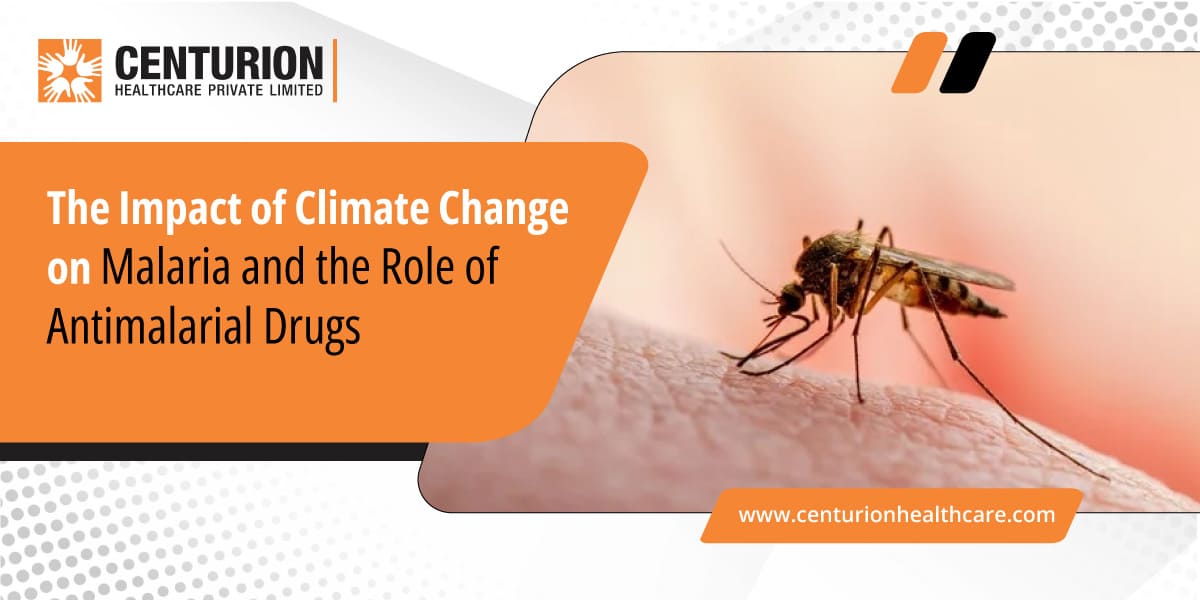A WHO-GMP Certified Company | GOVT. Recognized Two Star Export House
Call us for any question+(91)-8488868585

Apr 12, 2024
As climate change continues to affect our planet, its repercussions are felt across various aspects of life, including public health. Malaria, a disease caused by parasites transmitted through the bite of infected mosquitoes, is intricately linked to environmental conditions. In this blog, we delve into the profound impact of climate change on malaria incidence and explore the pivotal role of antimalarial drugs in combating this global health challenge.
Climate change alters temperature and precipitation patterns, creating favorable conditions for the breeding and survival of mosquitoes, particularly those that transmit malaria. As temperatures rise, the geographic range of these mosquitoes expands, reaching regions previously unaffected by the disease. Moreover, changes in rainfall patterns can lead to the creation of breeding sites, exacerbating mosquito proliferation.
According to recent studies, the incidence of malaria is projected to increase in many regions due to climate change. Sub-Saharan Africa, already burdened by a high malaria prevalence, is expected to bear the brunt of these changes. However, other regions, including parts of Asia and South America, are also at risk of experiencing a surge in malaria cases.
Preventing malaria requires a multifaceted approach that addresses both personal protection measures and community-wide interventions. Here are some key strategies to prevent malaria:
By implementing a comprehensive approach that encompasses both individual and community-level interventions, we can significantly reduce the burden of malaria and move closer to achieving the goal of malaria elimination.
Antimalarial drugs play a crucial role in the prevention and treatment of malaria. These medications target the parasites responsible for the disease, either by killing them directly or inhibiting their replication within the human body. Prompt and effective treatment with antimalarial drugs can save lives and prevent the spread of the disease.
At Centurion Healthcare, we are committed to manufacturing high-quality antimalarial drugs that adhere to international standards of safety and efficacy. As a leading antimalarial drugs manufacturer in India, we leverage state-of-the-art facilities and rigorous quality control measures to produce medications that meet the needs of healthcare providers and patients worldwide.
Our range of antimalarial drugs includes formulations suitable for both prophylaxis and treatment purposes. Whether it's preventing malaria in travelers visiting endemic regions or treating individuals diagnosed with the disease, our products offer reliable solutions backed by scientific research and clinical experience.
Centurion Healthcare is proud to be recognized as a reputable antimalarial drugs manufacturer in India. With a legacy of excellence spanning decades, we have earned the trust of healthcare professionals and organizations across the globe. Our commitment to innovation and quality drives us to continuously improve our products and manufacturing processes, ensuring that we deliver safe and effective medications to our customers.
In addition to serving the domestic market, Centurion Healthcare is a one of the best Antimalarial drugs exporters antimalarial drugs to various countries worldwide. We understand the importance of timely access to essential medications, especially in regions where malaria poses a significant health threat. Through strategic partnerships and efficient distribution channels, we strive to make our products accessible to those who need them most, regardless of geographical barriers.
If you're looking for reliable antimalarial drugs manufactured to the highest standards, look no further than Centurion Healthcare. Being one of the leading Antimalarial drugs suppliers, we are dedicated to combating malaria and improving global health outcomes.
Climate change poses a formidable challenge to public health, with malaria being one of its most significant consequences. As temperatures rise and weather patterns shift, the incidence of malaria is expected to increase in many parts of the world. However, with proactive measures and effective interventions, such as the use of antimalarial drugs, we can mitigate the impact of climate change on malaria and protect vulnerable populations.
At Centurion Healthcare, we are committed to playing our part in this global effort. As a trusted antimalarial drugs manufacturer in India, we strive to provide healthcare professionals and patients with the tools they need to combat malaria effectively. Together, we can work towards a future where malaria is no longer a threat to public health.